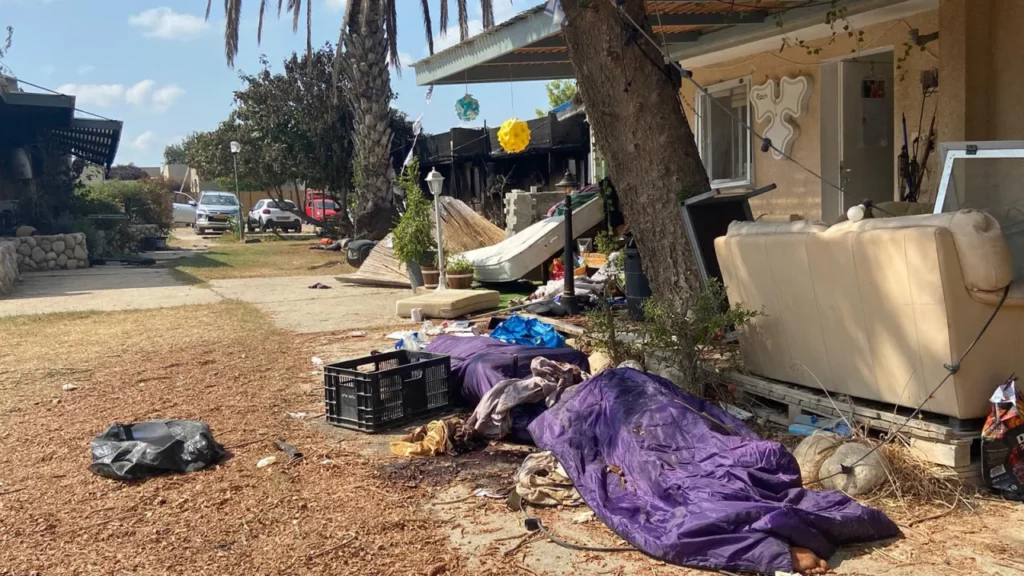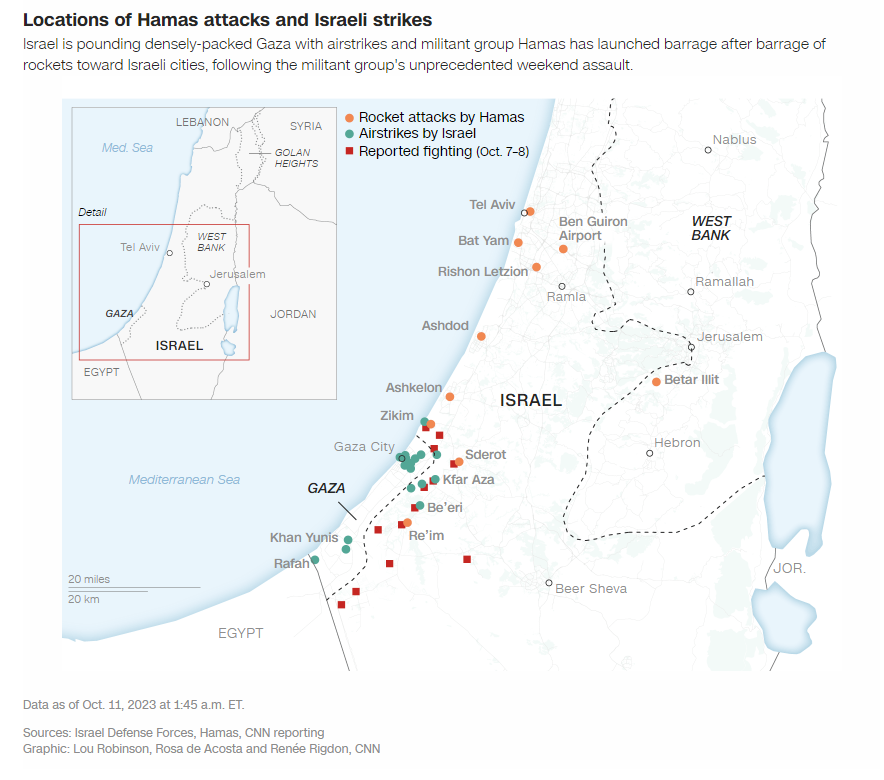An imperfect comparison is still an instructive one
By Brian E. Frydenborg (Twitter @bfry1981, LinkedIn, Facebook, Substack with exclusive informal content, my Linktree with all my public links/profiles) October 11, 2023 (slightly updated figures late afternoon)
(Arabic الترجمة العربية / Hebrew תרגום לעברית) The first article in a series of special reports about the 2023 Israel-Hamas-Middle East Crisis.
See related July 28, 2014 article The Israel-Hamas Gaza High-Stakes Poker Game of Death, October 26, 2015 article Blame Bibi Netanyahu for the Violence First, Then Blame Both the Israeli and Palestinian People; because of YOU, Real Context News surpassed one million content views on January 1, 2023, but I still need your help, please keep sharing my work and consider also donating! Real Context News produces commissioned content for clients upon request at its discretion. Also, Brian is running for U.S. Senate for Maryland and you can learn about his campaign here.

SILVER SPRING—It is utterly inevitable: in conflict and war, comparisons are made to other conflicts. They do not always even have to be from the real world: as I have discussed, Ukrainians regularly compare Russia to Mordor and Russian forces to orcs and have also seen themselves as the Rebel Alliance from Star Wars taking on a Russia embodying the Galactic Empire (Ukraine’s president Volodymyr Zelensky has even partnered with Mark Hamill—Luke Skywalker himself—to help bolster Ukraine’s drone fleet and war effort). Some pretty bad comparisons are being made about the current fighting in Israel and Palestine with the Russia-Ukraine war; as I have noted in even the right-leaning Israeli newspaper The Jerusalem Post, this is kind of ridiculous, because while Ukraine and Russia is virtually a one-sided, good-versus-evil issue, the behavior and context of Israel and the Palestinians (Hamas being one of two major Palestinian political factions and not particularly popular with or representative of Palestinians) is much more complicated, and I am not alone in making this point.
The 9/11 al-Qaeda attacks against the United States analogy being made by many, many people is both good and way off.
On the scale and psychological shock for both Israelis and Americans, the analogy holds: the Hamas attack is actually far worse proportionately, given Israel’s far smaller population and the still-increasing death toll (over 1,200 for Israelis conflicting reports of around 2,700 to 3,000 wounded as I am writing this; from a U.S. population in 2001 of about 285 million, 9/11 killed 2,977 people; Israel’s population is about 9.8 million today, with 73% being Jewish; if we lost the same portion of people as Israel has back in 2001, that would have been nearly 35,00 Americans killed and close to some 78,500-87,250 wounded. For historical comparison, the bloodiest day in American history is the battle of Antietam, during the U.S. Civil War on September 17, 1862, in which there were nearly 20,946 killed and wounded—only 3,654 of those killed—with both combatant sides being American; Pearl Harbor on December 7, 1941, saw 3,581 total U.S. killed and wounded, with 2,403 of those killed).

Palestinians killed in Gaza are over 1,100 and 5,300 wounded, while Israeli forces have counted roughly 1,500 attacking Hamas terrorists and fighters killed inside Israel thus far. Between Israel and Palestine, there are roughly an equal number of Palestinians/Arabs and Jews, though about of fifth of Israel’s citizens are Palestinians or Arabs, depending on how they identify (some with mixed feelings/loyalties and a thorny identity issue, as I have discussed recently), so there is trauma—deep, widespread trauma—being experienced now by everyone from the Jordan River to the Mediterranean Sea.
But while terrorist flying large planes into major hubs and landmarks in America was novel, the idea of Hamas and other fighters or terrorists in Gaza breaking through the border barriers to strike out at Israeli forces and communities, including hunting down civilians on the streets and in their homes to target them for murder and kidnapping, is an eventuality and fear that has consumed the Israeli mindset for years. What was novel was how “successful,” organized, large, and tactically proficient Hamas was in its effort, but that the effort would be undertaken was a given. So the idea that this was not long-anticipated is false. Conversely, the U.S. had key intelligence 9/11 on specific people and activities directly related to the 9/11 attacks passed up the chain in the months before 9/11, but the incompetence of the Bush Administration saw that it was not properly internalized and addressed. Therefore, the comparison of both being major “intelligence failures” is inaccurate; this is far more applicable to Israel today.
Another dissimilarity: Israel’s conflict did not start on October 7, nor was it a cold or frozen conflict with just a few isolated flashpoints spread out over time, as was the case with the U.S. and al-Qaeda in the years before 9/11. While the U.S. enraged many millions of Muslims and Arabs with controversial policies over decades, the U.S. was not engaged in any serious conflict directly with Al-Qaeda in the weeks and months prior to 9/11 and 9/11 was not carried out by people living in an enclave on the U.S. border with Mexico or Canada that the U.S. had been fighting and skirmishing on and off for years and in the days, weeks, and months before 9/11. The opposite is true with Israel and the Palestinians, including Hamas in Gaza. Especially since Israeli Prime Minister Benjamin Netanyahu’s extremist right-wing government came to power in late December 2022, there has been a cycle of escalating violence, incitement, and deliberately provocative acts back and forth between the Israeli government and Israeli Jewish settlers on one end, and Palestinian terrorist groups (namely Hamas and Islamic Jihad) and small groups of Palestinians engaging in their own acts of resistance and/or violence of their own accord on the other. This, even before Hamas’s stunningly “successful” (but entirely predictable in the attempt) attack and going back even before the ascent of Israel’s latest government for years, there has been a back-and-forth cycle of violence, dehumanization, and recrimination, one that erupted in 2023, leading to an explosion of violence that saw this year become most violent in the West Bank and East Jerusalem since 2005. And then, Hamas dramatically and historically escalated things even further just a few fays ago.
Relatively speaking, then, 9/11 could be said to be unprovoked in a recent-time sense, but it is hard to claim that this Hamas attack was unprovoked and not directly part of a hot conflict already underway in the sense that Israelis and Palestinians were engaged in increasing violence all throughout 2023 in East Jerusalem and the West Bank mostly, but also some violence in Gaza, too. To be clear, Israel and even some of its most extremist Jewish civilians engaging in actions that are deeply provocative to Palestinians month after month (and indeed, year after year, not that Palestinians do not do the same, they often do too) does not mean that, therefore, whatever reaction that comes from the Palestinians, including Hamas, is justified. In other words, provoked does not necessarily mean justified, and, indeed, clearly Hamas’s overall attack is not “brave” “resistance” against an enemy military force but a slaughter of non-combatants (of over 1,200 Israelis killed by Hamas, only 189 thus far are IDF, 45 are Israeli police, the rest and overwhelming majority being civilians, and that does not even deal with the at least 150 hostages taken by Hamas). Indeed, Hamas has pivoted to becoming more like ISIS than the Hamas of even a few years ago as it is now responsible for the worst single day of lethal violence targeting Jewish civilians since the Nazi-led Holocaust during World War II. Make no mistake, what Hamas perpetrated against the civilians of southern Israel near the Gaza Strip is a terroristic genocidal act of mass-murder and ethnic cleansing, an anti-Semitic pogrom that harkens back to a much darker era of humanity: in just one kibbutz of about 1,000 people called Be’eri, at least over 100 were killed—at least 10% of the population.
Another deep issue I will mention simply for the reader to consider without discussing: the U.S. had no solid, detailed exit strategy for its military interventions in which it engaged after 9/11 and the results were mostly counterproductive and with a massive human cost and the repercussions still very much being felt. Given Israel’s track record in Gaza, the West Bank, and Lebanon of not really having a political strategy but only tactical responses, it is deeply unlikely that Israel has any serious, mature, or realistic plan for what to do in Gaza once this war “ends,” so, quite likely, there is another for the similarities column.
In the end, considering 9/11 is useful both in its similarities with and in its differences from the insane, tragic death-spiral currently unfolding Israel, Gaza, and beyond in trying to understand said death-spiral.
See all of Brian’s work on the Israeli-Palestinian conflict here.
© 2023 Brian E. Frydenborg all rights reserved, permission required for republication, attributed quotations welcome
Also see Brian’s eBook, A Song of Gas and Politics: How Ukraine Is at the Center of Trump-Russia, or, Ukrainegate: A “New” Phase in the Trump-Russia Saga Made from Recycled Materials, available for Amazon Kindle and Barnes & Noble Nook (preview here).

If you appreciate Brian’s unique content, you can support him and his work by donating here; because of YOU, Real Context News surpassed one million content views on January 1, 2023. Real Context News produces commissioned content for clients upon request at its discretion.
Feel free to share and repost this article on LinkedIn, Facebook, Threads, and Twitter. If you think your site or another would be a good place for this or would like to have Brian generate content for you, your site, or your organization, please do not hesitate to reach out to him!